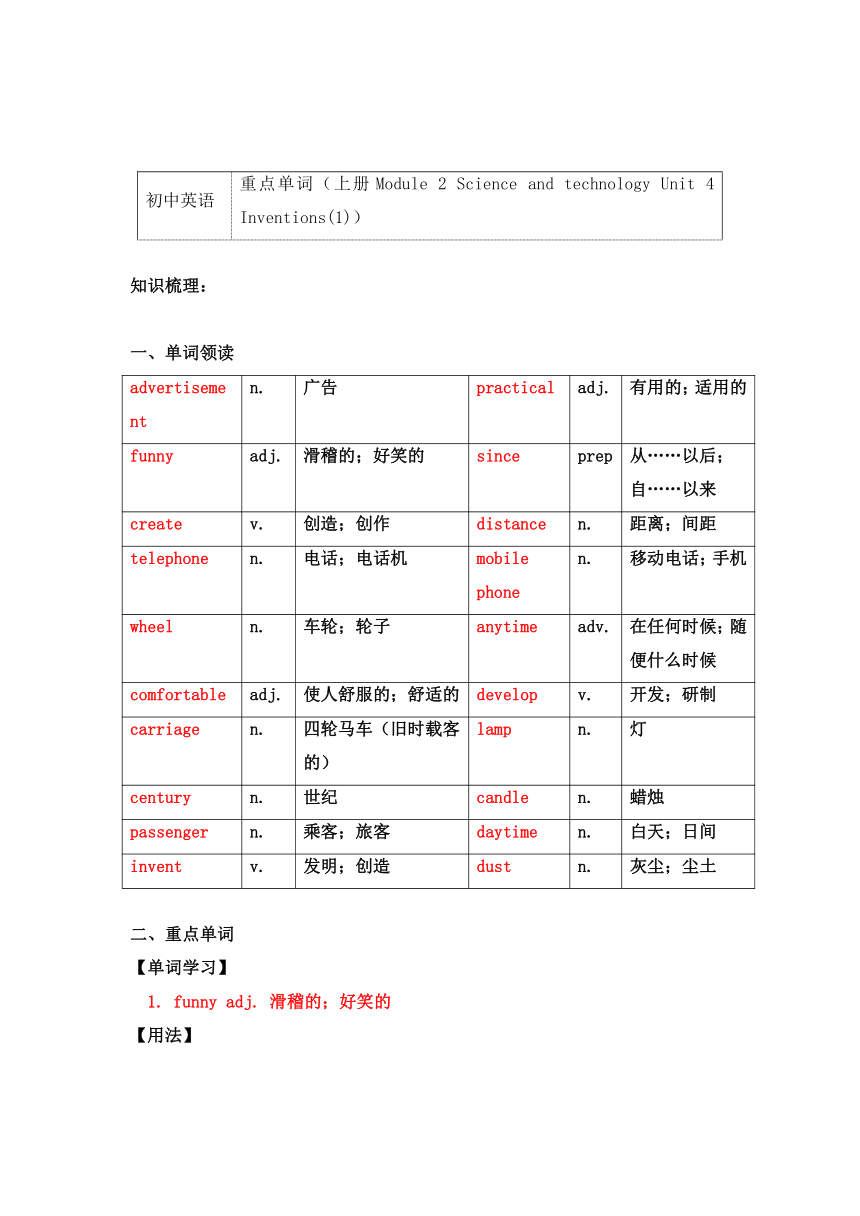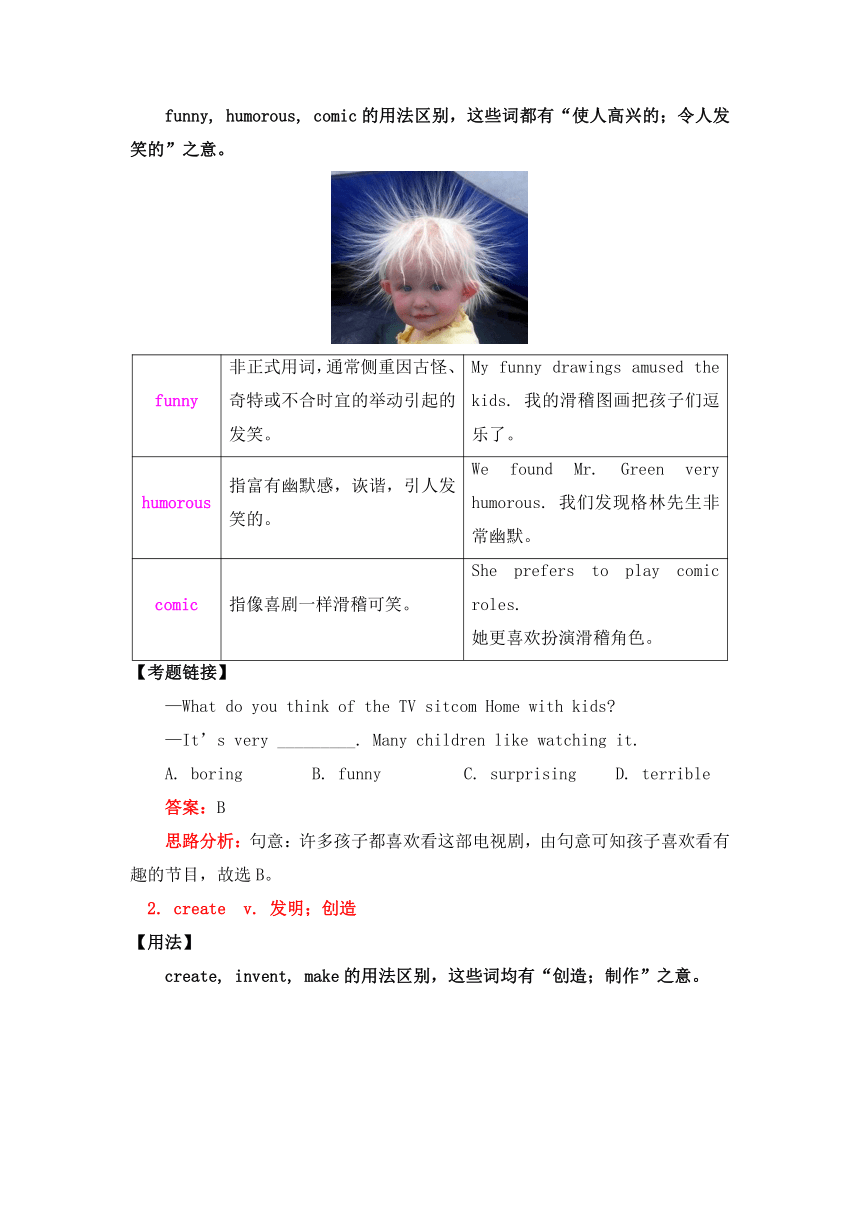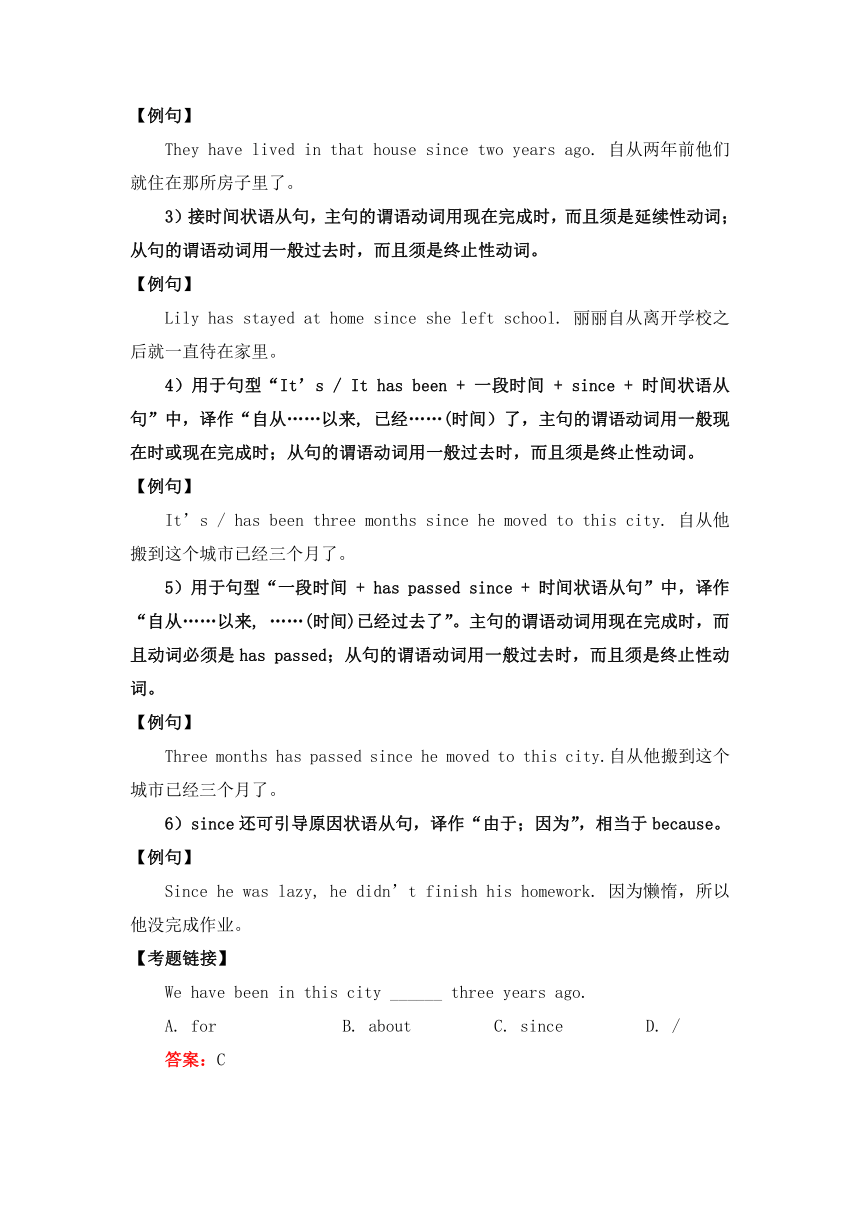英语八年级上册知识讲义 重点单词(Module 2 Science and technology Unit 4 Inventions(1))牛津深圳版
文档属性
| 名称 | 英语八年级上册知识讲义 重点单词(Module 2 Science and technology Unit 4 Inventions(1))牛津深圳版 |

|
|
| 格式 | doc | ||
| 文件大小 | 156.5KB | ||
| 资源类型 | 教案 | ||
| 版本资源 | 牛津深圳版 | ||
| 科目 | 英语 | ||
| 更新时间 | 2020-09-17 00:00:00 | ||
图片预览





文档简介
初中英语 重点单词(上册Module 2 Science and technology Unit 4 Inventions(1))
知识梳理:
一、单词领读
advertisement n. 广告 practical adj. 有用的;适用的
funny adj. 滑稽的;好笑的 since prep 从……以后;自……以来
create v. 创造;创作 distance n. 距离;间距
telephone n. 电话;电话机 mobile phone n. 移动电话;手机
wheel n. 车轮;轮子 anytime adv. 在任何时候;随便什么时候
comfortable adj. 使人舒服的;舒适的 develop v. 开发;研制
carriage n. 四轮马车(旧时载客的) lamp n. 灯
century n. 世纪 candle n. 蜡烛
passenger n. 乘客;旅客 daytime n. 白天;日间
invent v. 发明;创造 dust n. 灰尘;尘土
二、重点单词
【单词学习】
1. funny adj. 滑稽的;好笑的
【用法】
funny, humorous, comic的用法区别,这些词都有“使人高兴的;令人发笑的”之意。
funny 非正式用词,通常侧重因古怪、奇特或不合时宜的举动引起的发笑。 My funny drawings amused the kids. 我的滑稽图画把孩子们逗乐了。
humorous 指富有幽默感,诙谐,引人发笑的。 We found Mr. Green very humorous. 我们发现格林先生非常幽默。
comic 指像喜剧一样滑稽可笑。 She prefers to play comic roles.
她更喜欢扮演滑稽角色。
【考题链接】
—What do you think of the TV sitcom Home with kids?
—It’s very _________. Many children like watching it.
A. boring B. funny C. surprising D. terrible
答案:B
思路分析:句意:许多孩子都喜欢看这部电视剧,由句意可知孩子喜欢看有趣的节目,故选B。
2. create v. 发明;创造
【用法】
create, invent, make的用法区别,这些词均有“创造;制作”之意。
create 侧重创造出来的东西以前并不存在,或者指独具特色的创作。 Let us act together to create a smooth road! 让我们大家行动起来,一起创造一条畅通的道路!
invent 主要用于科技领域,指通过思考、研究或实验制造出前所未有的、极为有用的东西。 Cheap cars can be expensive to invent. 低价车的创造是很费精力的。
make 最普通的用词,指任何东西的创作或制造。 They are using a new way to make glass. 他们正在用一种新方法制造玻璃。
【考题链接】
—Have you ever heard of Dolly, the cloned sheep?
—Yes, she ____________ in Scotland a few years ago.
A. created B. was discovered
C. was created D. discovered
答案:C
思路分析:discover “发现”,指本来存在但没人知道的,故排除B、D;create “创造”,指创造新的事物,且本句需用被动语态,故选C。
3. since prep. 从……以后;自……以来
【用法】
1)接时间点,谓语动词用现在完成时,而且须是延续性动词。
【例句】
I have stayed in that country since 1995. 自从1995年我就待在那个国家了。
2)接一段时间 + ago,谓语动词用现在完成时,而且须是延续性动词。
【例句】
They have lived in that house since two years ago. 自从两年前他们就住在那所房子里了。
3)接时间状语从句,主句的谓语动词用现在完成时,而且须是延续性动词;从句的谓语动词用一般过去时,而且须是终止性动词。
【例句】
Lily has stayed at home since she left school. 丽丽自从离开学校之后就一直待在家里。
4)用于句型“It’s / It has been + 一段时间 + since + 时间状语从句”中,译作“自从……以来, 已经……(时间)了,主句的谓语动词用一般现在时或现在完成时;从句的谓语动词用一般过去时,而且须是终止性动词。
【例句】
It’s / has been three months since he moved to this city. 自从他搬到这个城市已经三个月了。
5)用于句型“一段时间 + has passed since + 时间状语从句”中,译作“自从……以来, ……(时间)已经过去了”。主句的谓语动词用现在完成时,而且动词必须是has passed;从句的谓语动词用一般过去时,而且须是终止性动词。
【例句】
Three months has passed since he moved to this city.自从他搬到这个城市已经三个月了。
6)since还可引导原因状语从句,译作“由于;因为”,相当于because。
【例句】
Since he was lazy, he didn’t finish his homework. 因为懒惰,所以他没完成作业。
【考题链接】
We have been in this city ______ three years ago.
A. for B. about C. since D. /
答案:C
思路分析:since后可接时间名词,指某动作或情况自从过去某一时间点一直持续到现在。
4. invent v. 发明
【用法】
invent, discover的用法区别。
invent 指发明创造出一个原本没有的新事物。 This kind of machine was invented in the 1970’s.
这种机器是七十年代发明的。
discover 指发现本来就存在的事物。 I was happy to discover a very good restaurant near my house. 我很高兴在我家附近发现一家很好的餐厅。
【例句】
They invent tools and machines to help them in their work.
他们发明工具和机器来帮助他们的工作。
【考题链接】
Personal computers ________________ in 1976. It has changed the whole world.
A. have been invented B. are invented
C. were invented D. invented
答案:C
思路分析:computers 是invent这个动作的承受者,要用被动语态,再根据in 1976确定用一般过去时。
5. develop v.开发;研制
【用法】
develop的意思比较广,有“开发;发展;使成长;使发达;患(病)”等意思。
【例句】
We must develop the natural resources of our country.
我们必须开发我们国家的天然资源。
Languages develop continually through usage. 语言在使用中不断发展。
He developed a heavy cold and could not go to school. 他得了重感冒不能去上学了。
【考题链接】
英译汉:Warm rains and summer sunshine develop the plants.
___________________________________________________
答案:暖雨和夏日阳光使植物生长。
【即学即练】
据意填词
1. When did Alexander _________the telephone?
2. They’ve been best mates _________school.
3. He told such _________ stories that we all laughed.
4. An artist should _________ beautiful things.
5. If these areas can begin to _________, their future will be bright.
答案:1. invent 2. since 3. funny 4. create 5. develop
同步练习:
(答题时间:15分钟)
Ⅰ. 用括号中所给单词的正确形式填空。
1. The following are three of the most important _________(invent) in history.
2. After the invention, traveling became faster and _________(comfortable).
3. Since then, people _________(be) able to speak to each other over long distances.
4. They allow people _________(keep) in touch with each other anytime, anywhere.
5. Thomas Edison _________(develop) the first practical light bulb in 1879.
Ⅱ. 选择并抄写单词。
1. What do you think is the most important _________ (invent; invention) in the world?
2. Computers help us _________(find; finding) information easily.
3. With light bulbs, people can do as _________(many; more) things in the evenings as they can in the daytime.
4. Can you imagine _________(to live; living) without them?
5. They also _________(make; created) a lot of problems.
Ⅲ. 阅读理解
The first robots were invented in the 1920s. Robots have appeared in many American films. In some films, they are stronger, faster and cleverer than people.
In real life, robots are mainly used in factories. They do some dangerous and difficult jobs for humans.
Robots also help disabled people, for example, blind people. Today many blind people have a guide(向导) dog to help them. In the future, guide dogs might be robot dogs.
One kind of robot guide dog has wheels. It moves in front of the owner. It is very clever. It knows the speed of its owner’s walk. The owner wears a special belt(带子). This belt sends instructions to the owner from the dog, such as “Stop here”, “Turn left” or “Turn right”.
In the United States, another kind of robot helps disabled people to take care of themselves in their daily life. The robot hears the sound of its owner’s voice. It follows instructions such as “Turn the page” or “Make a cup of coffee”.
Robots are also used in American hospitals. They can do simple jobs. At one hospital, for example, a robot takes meals from the kitchen to patient’s rooms. It never gets lost because this robot has a map of the hospital in its computer memory.
Though robots can help people in many ways, they will never take the place of humans.
1. From the passage, we know robots cannot be_______.
A. dangerous animals B. factory workers
C. guide dogs D. hospital helpers
2. A robot guide dog _______.
A. goes in front of blind people B. walks side by side with blind people
C. has a map in its head D. helps patients with their meals
3. The underlined word “disabled” means______.
A. 不能的 B. 有害的 C. 失灵的 D. 残疾的
4. Some disabled people need robots’ help to _______.
A. take care of themselves B. talk to other people
C. become scientists D. do dangerous jobs
5. In the passage, the writer wants to tell us that_______.
A. robots are stronger and cleverer than humans
B. disabled people cannot look after themselves without the robots
C. robots will take the place of humans some day in the future
D. robots can help humans in many different ways
答案:
Ⅰ. 1. inventions 2. more comfortable 3. have been 4. to keep 5. developed
Ⅱ. 1. invention 2. find 3. many 4. living 5. created
Ⅲ. AADAD
知识梳理:
一、单词领读
advertisement n. 广告 practical adj. 有用的;适用的
funny adj. 滑稽的;好笑的 since prep 从……以后;自……以来
create v. 创造;创作 distance n. 距离;间距
telephone n. 电话;电话机 mobile phone n. 移动电话;手机
wheel n. 车轮;轮子 anytime adv. 在任何时候;随便什么时候
comfortable adj. 使人舒服的;舒适的 develop v. 开发;研制
carriage n. 四轮马车(旧时载客的) lamp n. 灯
century n. 世纪 candle n. 蜡烛
passenger n. 乘客;旅客 daytime n. 白天;日间
invent v. 发明;创造 dust n. 灰尘;尘土
二、重点单词
【单词学习】
1. funny adj. 滑稽的;好笑的
【用法】
funny, humorous, comic的用法区别,这些词都有“使人高兴的;令人发笑的”之意。
funny 非正式用词,通常侧重因古怪、奇特或不合时宜的举动引起的发笑。 My funny drawings amused the kids. 我的滑稽图画把孩子们逗乐了。
humorous 指富有幽默感,诙谐,引人发笑的。 We found Mr. Green very humorous. 我们发现格林先生非常幽默。
comic 指像喜剧一样滑稽可笑。 She prefers to play comic roles.
她更喜欢扮演滑稽角色。
【考题链接】
—What do you think of the TV sitcom Home with kids?
—It’s very _________. Many children like watching it.
A. boring B. funny C. surprising D. terrible
答案:B
思路分析:句意:许多孩子都喜欢看这部电视剧,由句意可知孩子喜欢看有趣的节目,故选B。
2. create v. 发明;创造
【用法】
create, invent, make的用法区别,这些词均有“创造;制作”之意。
create 侧重创造出来的东西以前并不存在,或者指独具特色的创作。 Let us act together to create a smooth road! 让我们大家行动起来,一起创造一条畅通的道路!
invent 主要用于科技领域,指通过思考、研究或实验制造出前所未有的、极为有用的东西。 Cheap cars can be expensive to invent. 低价车的创造是很费精力的。
make 最普通的用词,指任何东西的创作或制造。 They are using a new way to make glass. 他们正在用一种新方法制造玻璃。
【考题链接】
—Have you ever heard of Dolly, the cloned sheep?
—Yes, she ____________ in Scotland a few years ago.
A. created B. was discovered
C. was created D. discovered
答案:C
思路分析:discover “发现”,指本来存在但没人知道的,故排除B、D;create “创造”,指创造新的事物,且本句需用被动语态,故选C。
3. since prep. 从……以后;自……以来
【用法】
1)接时间点,谓语动词用现在完成时,而且须是延续性动词。
【例句】
I have stayed in that country since 1995. 自从1995年我就待在那个国家了。
2)接一段时间 + ago,谓语动词用现在完成时,而且须是延续性动词。
【例句】
They have lived in that house since two years ago. 自从两年前他们就住在那所房子里了。
3)接时间状语从句,主句的谓语动词用现在完成时,而且须是延续性动词;从句的谓语动词用一般过去时,而且须是终止性动词。
【例句】
Lily has stayed at home since she left school. 丽丽自从离开学校之后就一直待在家里。
4)用于句型“It’s / It has been + 一段时间 + since + 时间状语从句”中,译作“自从……以来, 已经……(时间)了,主句的谓语动词用一般现在时或现在完成时;从句的谓语动词用一般过去时,而且须是终止性动词。
【例句】
It’s / has been three months since he moved to this city. 自从他搬到这个城市已经三个月了。
5)用于句型“一段时间 + has passed since + 时间状语从句”中,译作“自从……以来, ……(时间)已经过去了”。主句的谓语动词用现在完成时,而且动词必须是has passed;从句的谓语动词用一般过去时,而且须是终止性动词。
【例句】
Three months has passed since he moved to this city.自从他搬到这个城市已经三个月了。
6)since还可引导原因状语从句,译作“由于;因为”,相当于because。
【例句】
Since he was lazy, he didn’t finish his homework. 因为懒惰,所以他没完成作业。
【考题链接】
We have been in this city ______ three years ago.
A. for B. about C. since D. /
答案:C
思路分析:since后可接时间名词,指某动作或情况自从过去某一时间点一直持续到现在。
4. invent v. 发明
【用法】
invent, discover的用法区别。
invent 指发明创造出一个原本没有的新事物。 This kind of machine was invented in the 1970’s.
这种机器是七十年代发明的。
discover 指发现本来就存在的事物。 I was happy to discover a very good restaurant near my house. 我很高兴在我家附近发现一家很好的餐厅。
【例句】
They invent tools and machines to help them in their work.
他们发明工具和机器来帮助他们的工作。
【考题链接】
Personal computers ________________ in 1976. It has changed the whole world.
A. have been invented B. are invented
C. were invented D. invented
答案:C
思路分析:computers 是invent这个动作的承受者,要用被动语态,再根据in 1976确定用一般过去时。
5. develop v.开发;研制
【用法】
develop的意思比较广,有“开发;发展;使成长;使发达;患(病)”等意思。
【例句】
We must develop the natural resources of our country.
我们必须开发我们国家的天然资源。
Languages develop continually through usage. 语言在使用中不断发展。
He developed a heavy cold and could not go to school. 他得了重感冒不能去上学了。
【考题链接】
英译汉:Warm rains and summer sunshine develop the plants.
___________________________________________________
答案:暖雨和夏日阳光使植物生长。
【即学即练】
据意填词
1. When did Alexander _________the telephone?
2. They’ve been best mates _________school.
3. He told such _________ stories that we all laughed.
4. An artist should _________ beautiful things.
5. If these areas can begin to _________, their future will be bright.
答案:1. invent 2. since 3. funny 4. create 5. develop
同步练习:
(答题时间:15分钟)
Ⅰ. 用括号中所给单词的正确形式填空。
1. The following are three of the most important _________(invent) in history.
2. After the invention, traveling became faster and _________(comfortable).
3. Since then, people _________(be) able to speak to each other over long distances.
4. They allow people _________(keep) in touch with each other anytime, anywhere.
5. Thomas Edison _________(develop) the first practical light bulb in 1879.
Ⅱ. 选择并抄写单词。
1. What do you think is the most important _________ (invent; invention) in the world?
2. Computers help us _________(find; finding) information easily.
3. With light bulbs, people can do as _________(many; more) things in the evenings as they can in the daytime.
4. Can you imagine _________(to live; living) without them?
5. They also _________(make; created) a lot of problems.
Ⅲ. 阅读理解
The first robots were invented in the 1920s. Robots have appeared in many American films. In some films, they are stronger, faster and cleverer than people.
In real life, robots are mainly used in factories. They do some dangerous and difficult jobs for humans.
Robots also help disabled people, for example, blind people. Today many blind people have a guide(向导) dog to help them. In the future, guide dogs might be robot dogs.
One kind of robot guide dog has wheels. It moves in front of the owner. It is very clever. It knows the speed of its owner’s walk. The owner wears a special belt(带子). This belt sends instructions to the owner from the dog, such as “Stop here”, “Turn left” or “Turn right”.
In the United States, another kind of robot helps disabled people to take care of themselves in their daily life. The robot hears the sound of its owner’s voice. It follows instructions such as “Turn the page” or “Make a cup of coffee”.
Robots are also used in American hospitals. They can do simple jobs. At one hospital, for example, a robot takes meals from the kitchen to patient’s rooms. It never gets lost because this robot has a map of the hospital in its computer memory.
Though robots can help people in many ways, they will never take the place of humans.
1. From the passage, we know robots cannot be_______.
A. dangerous animals B. factory workers
C. guide dogs D. hospital helpers
2. A robot guide dog _______.
A. goes in front of blind people B. walks side by side with blind people
C. has a map in its head D. helps patients with their meals
3. The underlined word “disabled” means______.
A. 不能的 B. 有害的 C. 失灵的 D. 残疾的
4. Some disabled people need robots’ help to _______.
A. take care of themselves B. talk to other people
C. become scientists D. do dangerous jobs
5. In the passage, the writer wants to tell us that_______.
A. robots are stronger and cleverer than humans
B. disabled people cannot look after themselves without the robots
C. robots will take the place of humans some day in the future
D. robots can help humans in many different ways
答案:
Ⅰ. 1. inventions 2. more comfortable 3. have been 4. to keep 5. developed
Ⅱ. 1. invention 2. find 3. many 4. living 5. created
Ⅲ. AADAD
